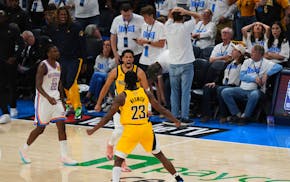Nearly four years after they agreed with Glen Taylor on a multiyear takeover of the franchise, Marc Lore and Alex Rodriguez prevailed Monday in a pivotal arbitration battle against Taylor that paves the way for them to become the controlling owners of the Timberwolves and Lynx, pending the NBA's approval. Some corners of Wolves fandom celebrated the move, given the lack of success the Wolves had under Taylor.
For others, the sometimes paranoid, fatalistic nature of being a Minnesota sports fan came around: "Now they can move the team," or "What will happen to Tim Connelly now?" became fodder for social media and Star Tribune comments sections. Here, we'll try to answer your questions related to the next steps under an impending Lore-Rodriguez ownership. Maybe we'll even calm your nerves a bit in the process. Probably not, though.
Can the NBA Board of Governors stop the sale?
While Taylor lost this arbitration ruling, he still owns the teams because the sale of his 40% ownership stake to Rodriguez and Lore needs to be approved by the NBA. The league had previously approved two 20% ownership stake transfers from Taylor to Lore and Rodriguez.
Assuming Taylor, who also owns the Minnesota Star Tribune, doesn't file a petition to challenge the arbitration panel's decision, NBA Commissioner Adam Silver will conduct an investigation into this sale and then submit that investigation to the NBA Board of Governors. That group, of which Taylor will remain a member until ownership changes hands, then votes to approve the sale. The league bylaws explain that, "A transfer shall only become effective if approved by the affirmative vote of not less than three-fourths of all Governors at a meeting duly called for such purpose."
This is likely Taylor's best hope for stopping the transfer of ownership. Twenty-three of 30 NBA owners would need to vote to approve Lore and Rodriguez as majority owners. Assuming Taylor is a "no" vote, that moves the number to 23 of 29 owners needed to approve. If Taylor, who was the chairman of the Board of Governors from 2008-2012 and again from 2014-17, can get seven other voters to side with him, the league would block the transfer of ownership.
Both parties in the arbitration and their representatives declined to comment beyond their statements released Monday.
Will the Timberwolves move? What's going on with a new arena?
If Lore and Rodriguez become owners, they are expected to want to build a new arena, and that long process will likely ramp up once they assume control. In 2020, the Minnesota Star Tribune reported there was a $50 million penalty for breaking the lease of Target Center before 2035. There will likely also be other costs associated with a move out of Target Center, which opened in 1990 and was renovated in 2017.
Lore and Rodriguez have maintained a commitment to keeping the team in Minnesota from the day they joined the ownership group. Their statement Monday after the arbitration ruling made sure to reference their efforts to win championships "in Minnesota." Over the past four years, there has been no indication that Lore or Rodriguez has been plotting to move the team.
The NBA's appetite seems set on expansion, likely to Las Vegas and Seattle (both of which already have WNBA franchises). Technically, the Wolves could relocate and a new team could pop up in Minnesota in their place, but we don't get the sense the NBA is going to want to complicate matters by attempting a relocation in the middle of two expansions. Doing that would also affect the pool of potential owners in Las Vegas and Seattle and could affect the expansion fees, which are set to be in the billions of dollars, perhaps more than they could get with an expansion fee in Minnesota. Why rock that very lucrative boat?
One factor can't be overlooked: Lore and Rodriguez are based on the East Coast. They won't want to fly all the way across the country to tend to an asset around which they both spend a lot of time. Here's a quote from Lore from a story we did about him in 2021: "[Minnesota is] within a distance of where I live where I can come out there all the time. If it was anything more west of there, it becomes more challenging."
(We're told that a trending Google search after Monday's announcement was "Who is Marc Lore?" That story can help answer that.)
This comes with the caveat that words are just words, and perhaps Lore and Rodriguez would use a potential move as leverage if they don't get what they want in terms of public funding for a new arena. But all indications point toward the fan base's fear of a move being nothing more than fear.
Will the owners pay the NBA luxury tax? What happens with Tim Connelly?
Lore and Rodriguez recruited Connelly to be the Wolves' president of basketball operations (with Taylor ultimately signing off on his hiring in 2022), and while Connelly moved an opt out in his contract from last summer to this one, that could have been a procedural move to buy time to get clarity on the ownership situation before negotiating a new deal.
It doesn't appear as if Connelly is looking for an out or wants to again move his family, who uprooted from Denver to come to Minnesota.
When the Wolves made the deal for Rudy Gobert in 2022, they did it with the understanding that the move would propel them into the luxury tax in future years. Ownership understood that, too. This season is the first time since 2019-20 that the Wolves were in the tax. They also vaulted way over into the dreaded second apron. The Wolves are trying to duck under the second apron in future seasons while retaining players such as Naz Reid and Nickeil Alexander-Walker.
This is not a signal that ownership is especially cheap; there are punitive roster-building restrictions that come with being a second-apron team that almost every team in the league is trying to avoid. The Wolves will still be in the luxury tax if they are above the first apron of the collective bargaining agreement. Chris Finch told reporters in Cleveland on Monday that he was confident Lore and Rodriguez would provide the necessary resources for the team to remain competitive, which in the modern NBA means paying the tax when you have a contending team.
As Lore said last season, he was "flush with cash."
"I've got literally hundreds of millions of dollars in the bank, ready to invest in the Wolves and bring home a championship," Lore said in March 2024. "We're never in a better spot."
Again, words are only words, but Lore and Rodriguez have maintained they want to build a winner in Minnesota, knowing that was going to mean pushing into the tax. That will be necessary to keep a competitive team around Anthony Edwards and keep him happy as the team's franchise player. This is the biggest question facing Lore and Rodriguez as it pertains to the on-court product in future seasons.
What's next for Glen Taylor after arbitration?
There is likely little avenue for an appeal of the arbitration ruling, according to legal experts in the Twin Cities.
"Arbitration awards are virtually unappealable," said Terrence Fleming, a lawyer at Fredrikson who specializes in business litigation. As a practical matter, Fleming said, the panel's 2-1 decision will be final.
Egregious examples of fraud or bias — for instance, if one of the arbitrators didn't disclose a relationship with either party — could be grounds for appeal, but legal experts said it's rare.
Even if Taylor no longer owns the two franchises, he'll have the option to remain a presence at Wolves and Lynx games. The purchase agreement stipulated that Taylor would receive, without charge, four courtside sets, one suite and two reserved parking spaces for every home regular season and playoff game for both teams. Those benefits would go to Taylor, or his heirs, for the remainder of Taylor's life or 10 complete seasons. Taylor has not been in attendance at a Wolves home game since he underwent hip replacement surgery late last year.
David Festa's return to Twins goes south in a hurry

NBA Finals: Haliburton caps huge rally with winning jumper as Pacers stun Thunder 111-110 in Game 1

Twins call up pitching prospect Travis Adams to bullpen

